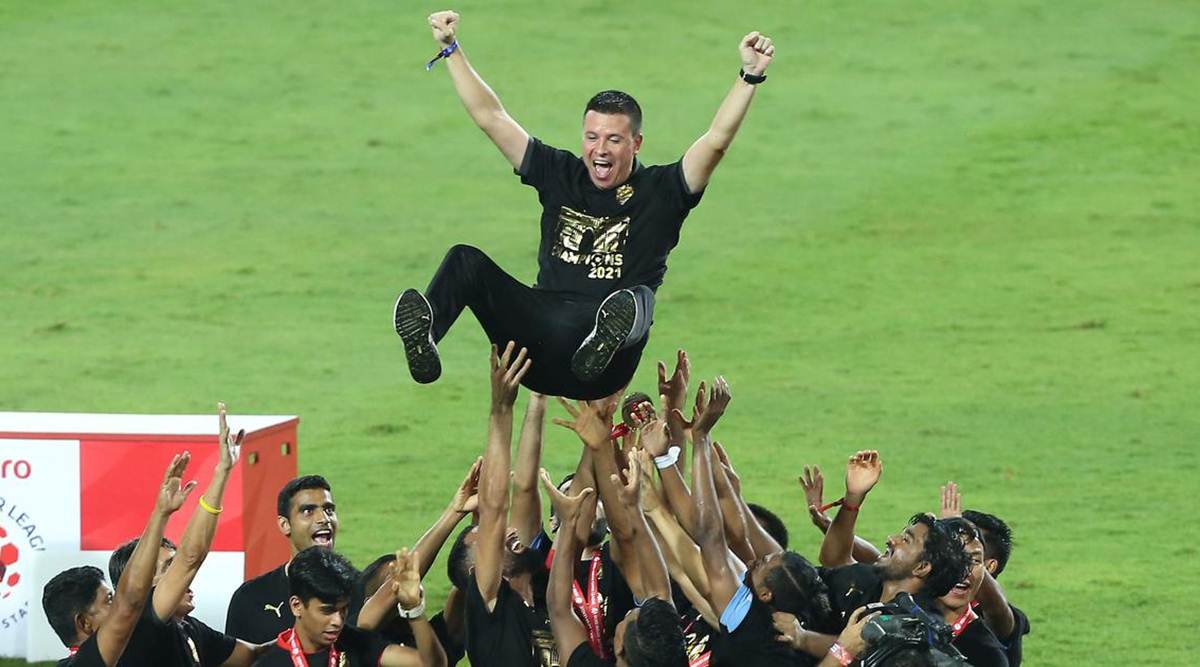 Mumbai City manager Sergio Lobera after his side’s 2-1 win over ATK Mohun Bagan on Saturday. (Source: ISL)
Mumbai City manager Sergio Lobera after his side’s 2-1 win over ATK Mohun Bagan on Saturday. (Source: ISL) ON SATURDAY, as Mumbai City won their maiden Indian Super League (ISL) title, the celebrations went far beyond the Fatorda Stadium in Goa. After all, this was a Mumbai win made in Manchester.
From the appointment of a manager to the signing of players and every pass made and each goal scored, a team of specialists at Manchester-based City Football Group (CFG) played a key role behind the scenes as Mumbai City transformed from being a mid-table team to becoming champions in a few months.
“The feeling is impossible to describe…It is very special,” manager Sergio Lobera said after his side’s 2-1 win over ATK Mohun Bagan in Saturday’s final.
For Lobera, the win felt special not just because it was his, and the team’s, first-ever ISL triumph but it is seen as a new beginning for the club — and maybe even Indian football. Mumbai City’s success story might trigger other mutually beneficial collaborations that would facilitate in-flow of expertise and talent from top footballing nations to India.
In late 2019, CFG, which also owns English Premier League side Manchester City, acquired a 65 per cent stake in the club that was earlier co-owned by actor Ranbir Kapoor and chartered accountant Bimal Parekh. While the deal still requires regulatory approvals, the club is off to a perfect start on the field.
Mumbai City finished on top of the league table and by that virtue, qualified for the prestigious Asian Champions League. Then, they eked out hard-fought wins over two legs in the semifinals against last year’s table-toppers Goa before beating domestic giants ATK Mohun Bagan in the final.
“We had weekly calls with our football support unit in Manchester and bi-weekly calls with Brian Marwood, who runs our global football operations,” the club’s chief executive Damian Willoughby told The Indian Express. “Our colleagues in Manchester were intimately familiar with what was going on in our world. So Sergio and his staff were comfortable asking for advice and discussing football-related issues.”
Marwood’s department is responsible for the nine teams out of the 10 that operate under the CFG banner, with their flagship club Manchester City being the only exception. His mandate is to make sure all these teams follow the playing style professed by the visionary manager Pep Guardiola at Manchester City: controlling ball possession and pressing opponents when it is lost.
So, after CFG took over Mumbai, one of the first things that Marwood did was to appoint Lobera as manager. It was a natural choice, Willoughby said. Lobera had, after all, spent eight years at Barcelona, during which he coached at different levels and went as far as being the club’s assistant manager in 2012. And while Guardiola was still earning his coaching credentials, he was an intern under Lobera.
“The people I was working with at Barca are now with CFG. Pep, Txixi (Begiristain, Man City’s sporting director), Ferran (Soriano, CFG’s CEO). They are all now working with the same idea and the same philosophies,” Lobera told The Indian Express.
The club then signed 17 new players, Indian and foreigners — all hand-picked by Lobera’s backroom staff at Mumbai City and Marwood’s team in Manchester. “(But) copy-paste does not work. You have to adapt,” he said. Having spent three years in India as Goa’s manager before joining Mumbai, Lobera was aware of the technical limitations of players here.
But among ISL clubs, Lobera’s team developed a distinct style: not afraid to pass their way out of trouble from the back, exploiting the pace of players like Bipin Singh on the wings, using the creativity of French playmaker Hugo Boumous in the midfield and relying on Englishman Adam Le Fondre and Nigerian Bartholomew Ogbeche to score goals.
And while Lobera took care of the footballing aspects in Goa, where the league was held in a bio-bubble, the team from Manchester backed him up in other aspects: from getting an expert who works with CFG to looking after the playing surface and acquiring the services of sports psychologists.
“Because of the expertise within the group, we were able to coordinate with the sports psychologist team to talk about the importance of mental health and well-being and offer support if it was required,” Willoughby said. “The players, coaches…everyone spent more than 160 days in a bubble, so it was not easy.”
The focus will now shift to ensure a smooth transition from being dominant in India to being competitive in the Asian Champions League, a tournament reserved for the continent’s elite teams, next season.
“If someone told me we would achieve everything that we have in our first year, I would not have believed. So about the Asian Champions League, I don’t want to put limits,” said Lobera.